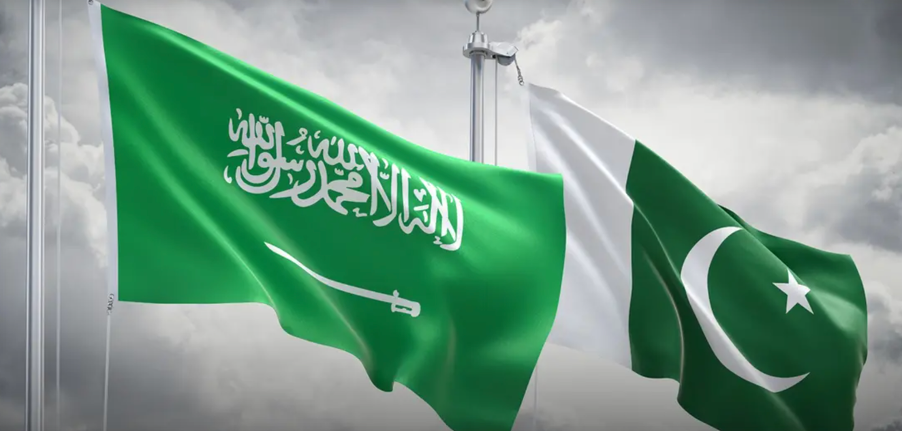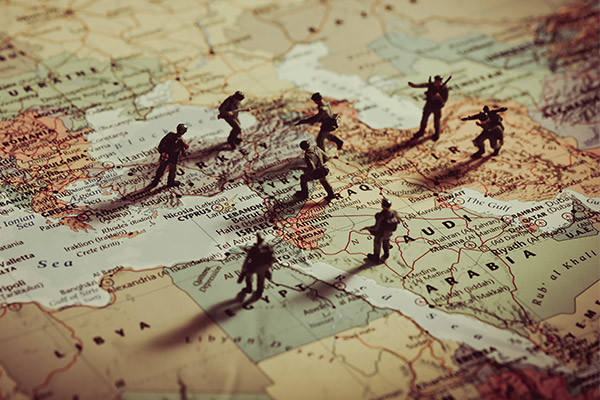Common interests in relations between Saudi Arabia and Pakistan
The intense communications between Saudi Arabia and the United Arab Emirates with Pakistan in recent months raises several questions related to the joint Gulf agenda with the new leadership in Pakistan. This issue occupies a wide range of media and research speculation due to the rapid frequency of news related to the Gulf support provided to Pakistan. Pakistan has a historically good relationship with the GCC countries, especially Saudi Arabia, with the security and military leadership in Pakistan. This is why security cooperation to deal with the Afghanistan issue is likely the drive for a fast-growing relationship, especially since it is clear that Saudi Arabia is not pursuing direct contact with the Taliban or direct involvement in Afghanistan. Nevertheless, technological and military cooperation remains the focal point for Western observers. Especially with the Saudi Minister of Energy`s recent announcement regarding developing national scientific capabilities in peaceful nuclear energy, which is explained differently in light of the failure of the JCPOA and the apparent lack of other means to contain the Iranian Nuclear Program.

- by Rasha Al Joundy ,
- Thursday, 19th January, 2023
Background of Gulf countries' economic aid to Pakistan:
The Kingdom of Saudi Arabia announced that it is studying increasing its investments in the Republic of Pakistan to reach ten billion dollars, in addition to the Saudi Fund for Development discussing increasing the amount of the deposit provided by Saudi Arabia to Pakistan Central Bank to reach five billion dollars after the three billion deposit was extended. Also, Saudi Arabia signed an agreement to finance oil derivatives in Pakistan at a value of one billion Dollars. At the same time, The United Arab Emirates took a similar position by approving a new loan amount of one billion dollars and extending a loan of two billion dollars to Pakistan's Central Bank.
These policies are considered parallel to the International community's efforts to support Pakistan and help it recover from the repercussions of recent floods, which led to the displacement of thousands of families in Pakistan from Their homes and the destruction of a massive part of the infrastructure in the cities.
Pakistan also suffers from a decline in foreign currency reserves in the Central Bank of Pakistan to less than six billion dollars at the beginning of 2023, which affects Pakistan's ability to import essential products, including food, medicine, and medical equipment. This means that economic problems and those related to climate change represent a direct threat to the stability of the Pakistani state and a potential impact on its internal civil peace.
The Gulf support coincides with Pakistani Prime Minister Shehbaz Sharif's visit to the UAE and another visit of the new Pakistani army commander, Lieutenant General Asim Munir, to Saudi Arabia and the UAE. This visit was Munir's first foreign visit since assuming office. Proper to mention that Shahbaz Sharif's first foreign trip after assuming the premiership was also to Saudi Arabia. This indicates the development of Pakistani relations with Saudi Arabia at the political and military levels in recent months, especially after previous Prime-minister Imran Khan. Furthermore, confirming that the Saudi relationship with the Pakistani military is historical and continuous, even if it went through periods of differences in viewpoints from time to time.
The importance of security cooperation with Pakistan:
Among the explanations for the interest of Saudi Arabia and the UAE in relations with Pakistan, the file of security cooperation between the Gulf states and Pakistan stands out with the deterioration happening in Afghanistan after the random and chaotic American withdrawal from Afghanistan and the Taliban returning to rule in this country. The US Republican Party, which has the majority in the US House of Representatives, began to open An investigation into this withdrawal Because of its negative repercussions on the image and trust in American foreign policy. However, the countries in the region are taking another path to deal with the repercussions of this withdrawal on regional security.
Pakistan, which has a long shared history and common borders with Afghanistan, has the most significant influence on regional and international engagement with Afghanistan, whether this is related to dealing with the Taliban or protecting Pakistan from the dangers posed by transforming Afghanistan again into a hotbed of Terrorist organizations and the repercussions this will have on Arab and Islamic countries' security policies.
The Saudi government is avoiding dealing directly with the Taliban to avoid the recurrent rhetoric of its old relations with the Taliban related to 9/11 or blaming Saudi Arabia for the Taliban's practices in Afghanistan after the American withdrawal by connecting it to roots in Wahhabism as was the case in 2001, which is something Saudi has passed over a long time ago.
At the same time, the continuous agreemnets between Pakistan and the Taliban, mainly at the security level, makes Saudi Arabia keen to invest in its relations with Pakistan and ensure that the threats from Afghan are contained without directly engaging in its complications.
The new Pakistani army commander is considered the ideal candidate to manage the Pakistani-Afghan Security relationship, given that he held the Director General of Military Intelligence position in 2017 and the Head of Internal Intelligence in 2018.
Threats of the situation in Afghan from Saudi Arabia and Pakistan's perspective:
Taliban rule in Afghanistan began with several dangerous incidents, but they were expected given the previous history of the Taliban ruling Afghanistan. The first one is preventing women from university education and women from working in international organizations, which led to disrupting of the work of these organizations, whose beneficiaries are often women and children.
For the Saudi government, which leads a vision of developmental and cultural reform, the Taliban's decision represents a threat to the new Saudi ideals and ideas that King Salman bin Abdulaziz and Prince Mohammed bin Salman, the Crown Prince, have sought to establish in recent years, which explains why the Kingdom has taken a fast political position that intersects with other Arab and Muslim countries' position. Other countries, including the UAE. The Saudi position was not only political through the ministry of foreign affairs but also religious through the Council of Senior Scholars, which considered the Taliban's decision to be inadmissible in Islam, emphasizing women's rights in Islam, which is not compatible with the decisions taken by the Taliban.
The second incident was the start of retaliatory operations against former officials in the former Afghan government, and the latest was the assassination of a parliamentary deputy in her home in the capital, Kabul. Also, the emergence of terrorist operations in Pakistan led to the killing of security officials in an armed attack in the Punjab province at a time when Pakistan is suffering from political tensions related to former Prime Minister Imran Khan's continuous attempt to come back to power. The rise of terrorism in Pakistan through Afghanistan and the hard-political situation in both countries could be a threatening indicator of the security prospect in the region as a whole. For GCC countries, it is a convincing reason to ensure Pakistan is on the right side and that it can help with deterrence.
The Iranian nuclear threat impact on Saudi-Pakistani rapprochement:
The military rapprochement between Saudi Arabia and Pakistan, through the new army commander, reminds some political streams of what is considered an old Saudi investment in the Pakistani nuclear program, especially with the US administration's failure to persuade Iran to sign an agreement on its nuclear program and Tehran's continued violation of the restrictions imposed by the agreement, which is still observed by the rest of the signatories to the JCPOA.
This cast a shadow on Gulf and Arab security if Iran was able to produce its first nuclear bomb.
This perception of security dilemma prompted Washington Institute to focus on Saudi-Pakistan possible cooperation on nuclear and missile technology after the visits of both Shahbaz Sharif and General Asim Munir to the Gulf capitals, and not paying much attention to the extent of the security risks that they face regarding Afghanistan after it was abandoned hastily without any arrangement with regional countries.
The American choice was based on an electoral promise, but it also was a choice related to the increasing importance of other regions along with increasing competition between the US and China.
For Saudi Arabia and other Gulf countries, it is also a matter of priorities and interests. Therefore, it is possible to understand any agreement that may arise with Pakistan to protect Gulf national security, including any necessary military and intelligence cooperation from confronting the rise of terrorism or even to confront the possibilities of the Iranian nuclear program, an endeavor that Saudi Arabia did not hide its pursuit of, whether according to the statements of Crown Prince Mohammed bin Salman or the statements of Saudi Energy Minister Prince Abdulaziz bin Salman recently, in which he talked about the transfer of knowledge in the field of peaceful nuclear energy. Despite journalistic interpretations of more nefarious intentions, these endeavors are consistent with the economic interests of Saudi Arabia's Vision 2030.
The relationship with Pakistan will lead to the growth of security, economic and military relations, positively affecting international security, mainly containing terrorism or ultimately deterring the Iranian nuclear threat.

Rasha Al Joundy
Research Supervisor
Read More
Areas of Expertise
- Expert in the Gulf region politics,
- Security and internal affairs and has been working on the GCC region since 2011.
Education
- Master’s degree in International Relations and World Order at Leicester University (UK 2016).
- Graduated from the Faculty of Law – University of Damascus in Syria in 2006
Bio
completed her master’s degree in International Relations and World Order at Leicester University (UK 2016). She graduated from the Faculty of Law – University of Damascus in Syria in 2006, and trained as a lawyer to register at Damascus bar association. She is an expert in the Gulf region politics, security and internal affairs and has been working on this region since 2011. Rasha Currently work as a senior researcher for Gulf affairs and supervise the training program at Dubai Pubic Policy Research Centre.

